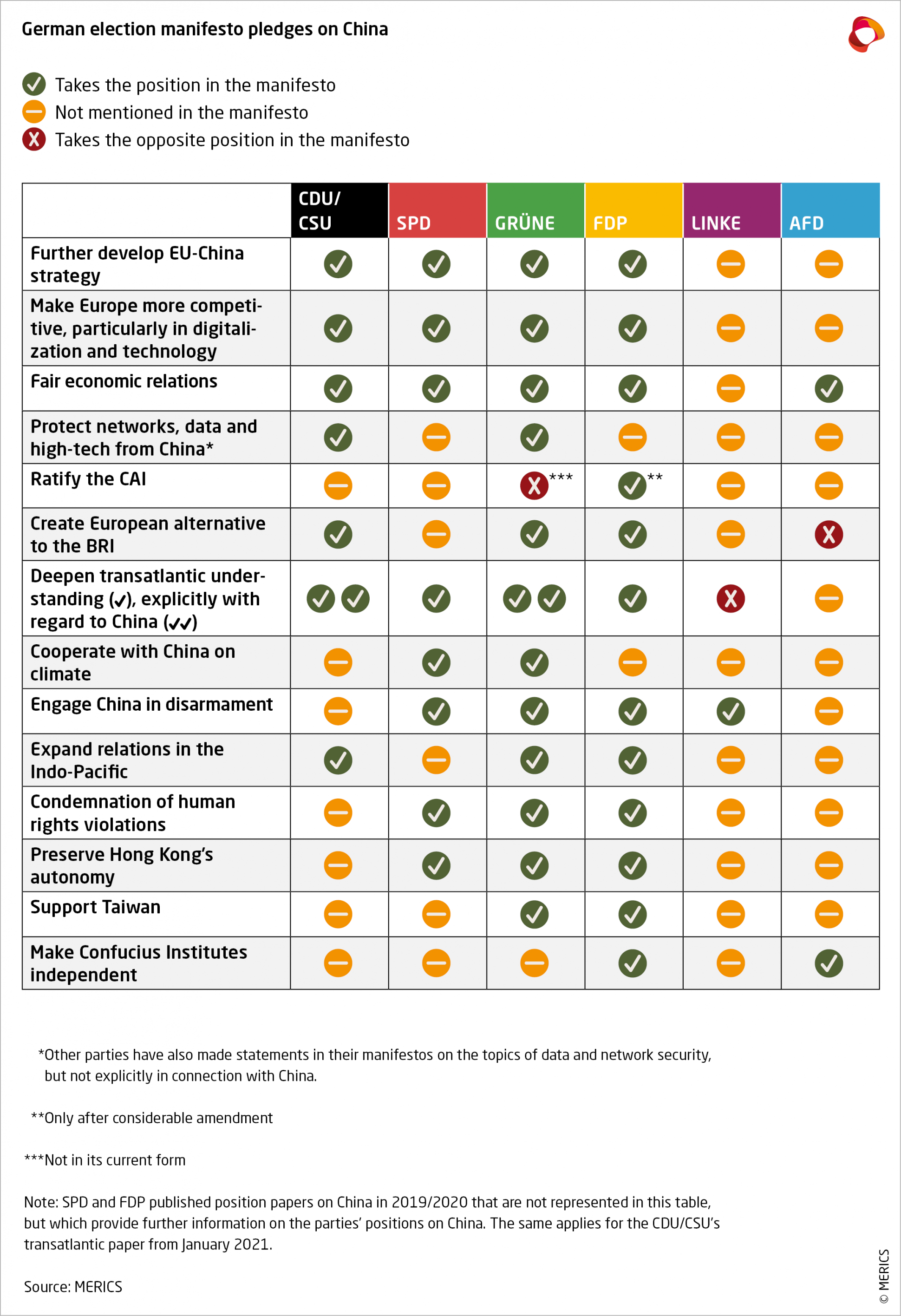

Germany’s future China policy – a look into the election campaign
Germany has voted. The coming weeks will decide who will form the new federal government. Whatever happens, it will likely involve the Greens and the FDP. And that will have consequences for Germany’s policy on China, as both parties are more critical of China than others on many issues. Ariane Reimers, Senior Fellow at MERICS, took a closer look at the two parties’ manifestos just a few weeks ago and made this comparison.
The Merkel era is drawing to a close. The German General elections are scheduled to take place in three months, before the new Chancellor will move into office in the fall. The extent to which a future Chancellor Laschet of the Christian Democratic Union (CDU) or a future Chancellor Baerbock (Greens) will change Germany's China policy is speculation at this point. Looking into the manifestos of the German parties will give voters some insight into what the future might hold. This time, China plays a bigger role in the lead up to the election. What is new is the parties’ inclusion of their China policy, some even devoted an entire chapter or a long paragraph to it.
Almost all parties are taking a critical look at China, with a focus on topics such as geostrategic challenges, market access conditions and the human rights situation. And yet all parties emphasize different points. While the CDU and its Bavarian sister party, the Christian Social Union (CSU) mainly emphasize the foreign and security policy challenges that China pose, the Greens focus on the human rights situation and the need for a climate dialogue.
The SPD also condemns the situation in Xinjiang and Hong Kong but emphasizes its willingness to enter into dialogue. The FDP program covers topics related to China with particular focus on human rights violations, legal security and the expansion of relations with Taiwan. The Left is holding back with its criticism of China and is looking to maintain a equidistant position. Lastly, the AfD’s program is contradictory as on the one hand it supports Germany's participation in the Belt and Road Initiative (BRI), but on the other criticizes China's interference abroad via Confucius Institutes.
The four parties potentially involved in the future federal government, CDU/CSU, SPD, Greens and FDP, largely agree that China policy must be European. In addition, they unanimously demand fair economic ties, i.e., mutual market access under equal conditions and legal security. However, at this point the SPD has only formulated rather general terms. There is also a clear desire among all four parties to make Europe more competitive, especially in areas of digitization and technology.
The CDU/CSU and the Greens agree on some points. In their election manifesto both use the term of “competitor, partner, systemic rival” and both explicitly speak of utilizing transatlantic cooperation to confront China, especially when it comes to data protection and network security.
There is no mention of the human rights situation in the CDU/CSU’s program, whereas the SPD, Greens and FDP have all reached a consensus. The two current opposition parties go into greater detail on this point, for example when it comes to forced labor and compliance with the International Labour Organization (ILO) standards, public and electronic surveillance or the situation in Hong Kong. The fact that the Greens and the FDP are largely in agreement can be seen in a joint article by Reinhard Bütikofer (MEP, Greens) and Olaf in der Beek (MdB, FDP), which mentions human rights as an important topic for China policy.
Based on the manifestos, changes can be expected after the election. Current German China policy has been bilaterally oriented, especially regarding economic interests. Moving forward, this will be contrasted slightly by a stronger European orientation. In the 5G debate, too, the parties are at least implicitly in favour of a European solution and warn of a dependency on foreign digital technology. Should the FDP and the Greens be involved in the future federal government, a tougher approach towards China is likely.
Election programs, however, are only declarations of intent - the direction in which future German China policy will move will only become clear during the coalition negotiations.
More on the topic: “With the era Merkel coming to an end, Germany’s China policy seems set for change,“ says Barbara Pongratz in her short analysis on “Germany’s next China policy”.
Media coverage and sources:
- CDU/CSU election manifesto
- SPD election manifesto
- Green party election manifesto
- FDP election manifesto
- AfD election manifesto
- Die Linke election manifesto (draft)
- Tagesspiegel: Wie man einen Rivalen zähmt: Neun Thesen von Grünen und FDP zum Umgang mit China
You can subscribe to this publication on an individual basis. For more information, click here.
MERICS members also have privileged access to this product. If you want to learn more about our membership model for institutions and businesses, please click here.
If you are a MERICS member, you can access the full publication here.



